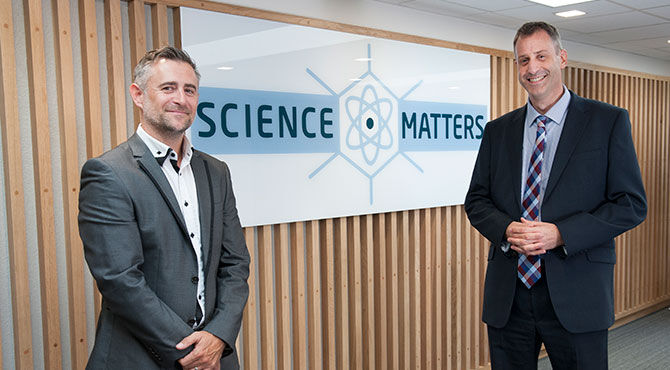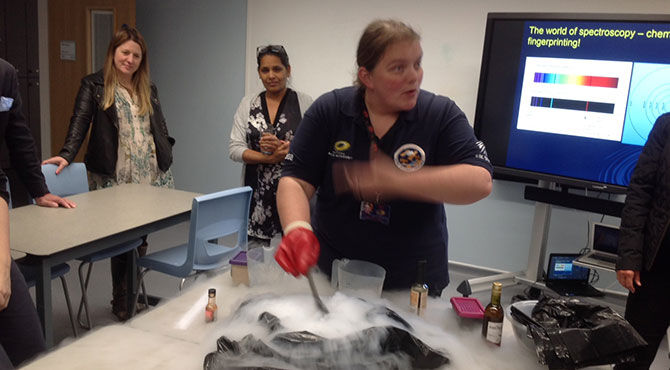STEM subjects: the key to employability
As the key to unlocking career prospects, STEM subjects are high on the national agenda. Fiona Murchie finds out how one international school is bringing the study of science to life for its students.

ACS opens new science centre
Forward-thinking ACS International Schools has tapped into the drive for STEM teaching and qualifications with the opening of a state-of-the-art £10 million Science Centre at its Hillingdon School this term. The new centre includes seven laboratories and features among its cutting-edge technology a specialist binocular microscope and reflecting telescope, as well as an electrophoresis unit that students can use to investigate and visualise DNA. Dr Neelu Sharma, head of science at ACS Hillingdon, said, “This summer, several of our graduating students won places to study biochemistry, pre-medicine, bio-medical sciences, physics and medicine at top universities. Our new science centre will ensure we provide the best possible resources for any of our students wanting to pursue an interest in the sciences at any level.” What better way to showcase these wonderful facilities than to invite a team from the National Space Academy to demonstrate their skills and inspire the next generations to push the frontiers of scientific discovery and reach for the stars?Not all the excitement was reserved for the children; I am the first to admit that I was thrilled to hold a tiny spec of Mars in a test tube. I was blown away by the drama of creating a ‘comet’ (from sand, carbon, alcohol and dry ice) that was a very good imitation of the picture on the screen from the Rosetta mission.What child could fail to be excited when space and the universe are brought to life in such an engaging way, with scientists sharing their knowledge and enthusiasm for not only space exploration but also spin-off technology, which is helping to make advances in areas such as satellite systems, artificial intelligence, meteorology and robotics?
Exploring space-related science
Three exciting hands-on sessions introduced visitors to different aspects of space-related science.- Robin, a lead educator for the National Space Academy since 2012, has a particular interest in human spaceflight. In his session, he combined his vast experience of teaching physics with personal knowledge gained through discussions with astronauts. Robin demonstrated how Newton’s Laws of Motion could be applied to modelling rockets. He also explained why getting astronauts back from space remained one of the most dangerous parts of a space mission, and demonstrated how the potential hazards could be mitigated.
- Sophie is the National Space Academy’s lead physics teacher. In her session, she explained that comets were thought to contain pristine material unchanged since the formation of the solar system, and that studying them provided information about the early solar system. Sophie used spectroscopic data obtained from space missions to show that comets contained a surprising range of organic compounds. In a dramatic finale, she demonstrated how we could use the main compounds found in comets to build an analogue comet nucleus
- Chris is a National Space Academy lead educator based at John Leggott Sixth Form College, in Scunthorpe. He has been selected as a National Expert STEM Teacher by the National Science Learning Centre. In his session, Chris talked about Mars’s fascinating history, which means that life may have started there at about the same time as it did on Earth. He went on to show how Mars had lost much of its atmosphere, and why it was unlikely that we would find life on the surface of Mars today. Chris demonstrated the conditions needed for life, and showed how we were gaining a better understanding of extremophiles (organisms that can live in conditions that are damaging to most life on Earth) and how this understanding might to point to where we should look for life within our solar system.
Related articles:
- Assessing global education systems
- STEM education: plugging the global skills shortage
- ACS Hillingdon opens £10 million school science centre
- Inspiring and challenging young minds: one school’s story
Join us at the National Space Centre
Anyone who attended the Relocate Awards Dinner in May and talked to those members of the National Space Academy team who acted as Innovation Ambassadors for the evening will appreciate that the academy does a first-rate job of inspiring teachers to use space as a way of engaging children with STEM. It is also keen to engage with employers and forge industry links.Relocate Global has 30 places for teachers to spend a day at the National Space Centre, in Leicester, on 15 May 2018. Schools, please email Vanessa McConnell to reserve your place. For employers, there is the opportunity of a similar innovation session. Please email Vanessa McConnell for details.For the 2018 Relocate Awards gala dinner on 10 May, we will build on the theme of innovation and embrace creativity by holding the evening at Shakespeare’s Globe Theatre, on London’s South Bank. Join us for a fantastic evening to celebrate success across the relocation arena.Don’t miss our Festival of Global Mobility Thinking, to be held the following day.About ACS Hillingdon
ACS Hillingdon International School is part of the ACS International Schools group, which has served both local and global families since 1978. Non-sectarian and coeducational, the school enrols over 570 students aged from four to 18. Its campus is located to the west of central London, within easy reach of the city and Heathrow Airport.ACS Hillingdon offers an international curriculum, including the International Baccalaureate (IB) Diploma and the US High School Diploma and Advanced Placement courses. As well as state-of-the-art facilities, the school has impressive grounds and an ongoing programme of investment. Strong core academic programmes are supported by outstanding co-curricular and extracurricular opportunities across sports, the visual and performance arts, leadership, and giving.Attend an ACS Open Morning
Meet ACS Hillingdon’s head of school, teachers, parents and students, and take a campus tour at one of the school’s Open Mornings:- Saturday 28 October – All School Open Day (ages three to 18)
- Friday 17 November, Divisional Open Day, Middle School/High School (ages ten to 18)
- Thursday 8 February, Divisional Open Day, Lower School/ Middle School/High School (ages three to 18)
- Saturday 17 March 2018, All School Open Day (ages three to 18)
For related news and features, visit our Education & Schools section.Access hundreds of global services and suppliers in our Online Directory
 Get access to our free Global Mobility Toolkit
Get access to our free Global Mobility Toolkit 
©2026 Re:locate magazine, published by Profile Locations, Spray Hill, Hastings Road, Lamberhurst, Kent TN3 8JB. All rights reserved. This publication (or any part thereof) may not be reproduced in any form without the prior written permission of Profile Locations. Profile Locations accepts no liability for the accuracy of the contents or any opinions expressed herein.



































